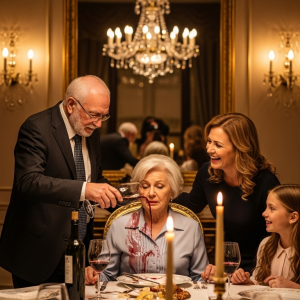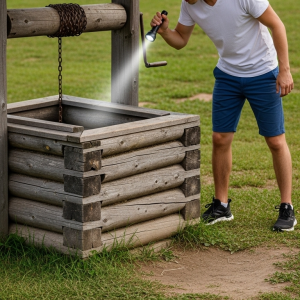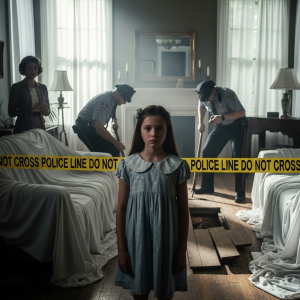The problem with time, eight-year-old Liam Parker had decided, was that it had two speeds. There was “story time,” a magical, elastic dimension where an hour could feel like a minute as he sketched superheroes in his notebook. And then there was “school time,” a rigid, merciless force where a single minute felt like a lead weight, threatening to pull him under.
This morning, the weights were heavier than usual. It had started with a frantic, house-wide search for his social studies diorama of a Native American village, which was eventually discovered in the laundry basket, having been mistaken for a curious collection of twigs and clay. By the time his dad, a kind man with paint-stained fingers and a perpetually distracted mind, found the car keys, the clock on the dashboard was a flashing red beacon of doom.
“I’m so sorry, champ,” his dad, Mark, said, his voice laced with the familiar guilt of a creative soul wrestling with a nine-to-five world. “I got lost in that mural I’m sketching. Time just… slipped away.”
Liam just nodded, his stomach churning. He could already picture Mrs. Grant’s face, her lips pressed into a thin, disappointed line. She wasn’t a mean teacher, not really, but she was a firm believer that the world ran on rules, and the most important rule of all was punctuality. “Punctuality is the foundation of respect, Liam,” she’d told him just last week, her voice sharp but not unkind. “It shows the world you are responsible. One more tardy, and I will have to call home.”
The thought of that call, of the disappointment from both his teacher and his parents, made Liam’s backpack feel ten times heavier. As his dad pulled up a block away from the school, Liam gave him a quick, reassuring hug. “It’s okay, Dad. I’ll be fast.” He leaped out of the car, his worn sneakers pounding the pavement. He had one last chance: the shortcut through the grocery store parking lot. It could save him at least three minutes. It could save his day.
The parking lot shimmered under the late August sun, the asphalt radiating a visible, wavy heat. The air was thick and still, smelling of hot metal and exhaust fumes. Liam ran, his breathing coming in short, sharp bursts, his focus narrowed on the school gate visible just beyond the last row of cars. He was a blur of motion, a small boy on a desperate mission against the clock.
He was halfway across the lot when a sound, thin and sharp, pierced his concentration. It was a cry, but it was muffled, as if coming from underwater. He slowed, his sneakers squeaking on the painted white lines, and glanced around. The lot was mostly empty, save for a few stray shopping carts and a silver sedan parked directly under the relentless glare of the sun.
The sound came again, weaker this time. It was coming from the car.
Liam’s curiosity warred with his urgency. He took a few hesitant steps closer, peering through the driver’s side window. The glare was intense, but as he shielded his eyes with his hand, the interior came into focus. And then he froze. His heart, which had been hammering from his run, now seemed to stop altogether.
Strapped into a car seat in the back was a baby. It couldn’t have been more than a year old. Its tiny face was a blotchy, alarming shade of red, streaked with tears and glistening with sweat. A halo of damp, dark hair was plastered to its forehead. The baby’s mouth was open in a silent, exhausted wail, its small chest heaving. The cry he’d heard was now just a faint, despairing whimper.
The car was an oven. A tomb. Liam’s mind raced. He looked around wildly, expecting to see a parent rushing back, but there was no one. The vast, empty parking lot felt like a deserted planet. He ran to the driver’s side door and pulled the handle. Locked. He scrambled to the passenger side, yanking on the handle with all his might. Locked. The back doors, the same. He was locked out, and the baby was locked in.
Panic, cold and sharp, seized him. The voice of Mrs. Grant echoed in his head, a phantom ticking clock. You’re already late, Liam. Don’t get distracted. No more excuses. But then he looked back at the baby, at its weakening cries and the terrifying flush of its skin. This wasn’t an excuse. This was a nightmare.
Every second felt like an eternity. Liam knew, with a certainty that went beyond his eight years of life, that he couldn’t leave. He couldn’t run to school and tell someone; it would take too long. He had to do something right now. The image of the baby’s face, so small and helpless, burned away all thoughts of tardy slips and disappointed teachers.
His eyes scanned the ground, searching for a solution. His gaze landed on a jagged, grey rock nestled in the sparse grass of the curb, about the size of his father’s fist. It was heavy, a piece of the unfeeling, adult world. His hands trembled as he picked it up. It felt impossibly solid, a tool of destruction that he, a boy who was told not to run with scissors, was about to use.
He stood before the passenger-side window, the rock held in his two small hands. He could see his own wide, terrified reflection in the glass, superimposed over the suffering child inside. He squeezed his eyes shut for a second. “I’m really sorry, Mister Car,” he whispered, his voice a tiny, shaky apology to the universe for the rule he was about to break.
He lifted the rock, his thin arms straining with the effort. With a grunt, he brought it down against the window. The impact resulted in a dull, unsatisfying thud and a small, white starburst on the glass. It wasn’t enough. Tears of frustration and fear stung his eyes. He had to be stronger.
He drew his arm back again, channeling all his panic, all his desperation, into the motion. He struck the window again, this time right in the center of the starburst. A loud crack echoed through the silent lot, and a web of spidery lines shot across the glass. He hit it a third time, and a fourth, his grunts now punctuated by sobs. Finally, with a loud, explosive pop, the window gave way, shattering into a thousand sparkling cubes that cascaded onto the car seat and the asphalt below.
His hands were scraped and stinging, but he barely noticed. He carefully brushed the remaining shards from the window frame and reached inside. The wave of heat that billowed out of the car was shocking, like opening a furnace. He fumbled with the complex buckle of the car seat, his fingers clumsy and slick with sweat. At last, it clicked open.
He gently, carefully, pulled the baby from the car. The little one was limp and frighteningly hot, its damp skin sticking to his t-shirt. Liam cradled the child against his chest, rocking him back and forth instinctively, just as he’d seen his mom do with his baby cousin. “It’s okay,” he whispered, his own tears dripping onto the baby’s sweaty head. “It’s okay. You’re safe now.”
The baby’s whimpers quieted, its breathing still shallow but steady. For a moment, standing there in the sun-baked parking lot, holding this rescued life in his arms, Liam felt a profound sense of rightness. And then, a scream tore through the air, sharp and full of fury.
“WHAT ARE YOU DOING TO MY CAR?! HEY! GET AWAY FROM MY BABY!”
Liam froze, his blood turning to ice. A woman was sprinting towards them, grocery bags swinging wildly from her arms, a carton of eggs slipping and splattering on the ground. Her face was contorted with a rage born of pure terror.
Her eyes first took in the catastrophic sight of her shattered car window. Then they locked onto Liam, a strange boy, holding her child. For a split second, her expression was one of absolute fear. But as she got closer and saw the state of her baby—the red face, the sweat-soaked clothes—her anger instantly dissolved into a dawning, soul-crushing horror of recognition. She hadn’t been angry at him; she had been terrified for her child.
“Oh my God,” she stammered, snatching the baby from Liam’s arms. “Oh, my sweet boy. I only went inside for ten minutes… I swear it was only ten minutes…” She collapsed to her knees, clutching her son, her body wracked with sobs of guilt and relief. Tears streamed down her face as she peppered his sweaty face with kisses. “Thank you,” she whispered, her gaze finally meeting Liam’s. “Oh, God, thank you.”
But before Liam could form a single word, a sound drifted across the parking lot, distant but unmistakable. The final school bell. His stomach plummeted into his sneakers. He was no longer just late; he was monumentally, catastrophically late. Without a word, without a thought, he turned and bolted, sprinting toward the school as if the hounds of hell were on his heels.
He burst through the classroom door moments later, a whirlwind of panicked energy. His hair was matted to his forehead with sweat, his shirt was damp, and his hands were a mess of small, bloody scrapes. The classroom was silent. Twenty-five pairs of eyes turned to stare at him. And at the front of the room, by the whiteboard, stood Mrs. Grant. Her arms were folded, and her expression was one of profound, unyielding disappointment.
“Liam Parker,” she said, and her voice, though not loud, cut through the silence like a knife. “You are late. Again.”
Liam’s chest heaved as he tried to catch his breath. He opened his mouth to explain, to tell her everything about the baby and the hot car and the rock. But the words wouldn’t come. How could he possibly explain it? It sounded like the most elaborate, unbelievable excuse ever invented. A baby was locked in a car, so I broke the window. It sounded like something out of one of his comic books. He could see the disbelief on her face before he even spoke.
His throat tightened. He looked down at the floor, at his scuffed sneakers. “I—I’m sorry, Mrs. Grant.”
“‘Sorry’ is not good enough, Liam,” she said, her voice firm, devoid of sympathy. “This is a pattern. And it ends today. We will be calling your parents this afternoon. You need to learn to take responsibility for your actions.”
The shame was a physical force, a hot wave that washed over him from his head to his toes. He walked to his desk in a fog, the other kids’ stares feeling like tiny needles. He sank into his chair, avoiding everyone’s eyes, and stared at the tiny cuts on his hands. No one had clapped for him. No one had called him a hero. He was just Liam. Late again. And for the first time, he wondered if maybe, just maybe, he had done the wrong thing.
The rest of the school day was a special kind of torture. During the math quiz, Liam couldn’t focus on the long division problems. All he could see was the spiderweb of cracks spreading across the car window. He kept replaying the sound of the glass shattering, the feeling of the baby’s hot skin against his own.
At recess, the other kids, sensing he was in trouble, treated him like an outcast. A boy named Kyle, who had a knack for being cruel, started a new chant. “Late-again-Liam, what’s your excuse? Did a monster eat your shoes?” A few others laughed. Liam just sat on the bench by himself, tracing the patterns on his scraped knuckles and wishing he could disappear. He knew he’d do it all over again, in a heartbeat. But he couldn’t understand why doing the right thing felt so incredibly lonely.
Back in class, Mrs. Grant seemed to watch his every move. When he dropped his pencil, her eyes narrowed. When he stared out the window, she cleared her throat pointedly. She wasn’t just his teacher anymore; she was his warden. And Liam was a prisoner, counting down the minutes to the final bell, which would signal the dreaded phone call home. He imagined his dad’s confused, hurt voice on the other end of the line. The thought was worse than any punishment Mrs. Grant could devise.
What Liam didn’t know was that a very different drama was unfolding in the school’s main office. A frantic young woman named Sarah had arrived minutes after he had, her baby, Leo, now calm and clutching a bottle of water provided by the paramedics she’d called. She was tearfully explaining the entire story to the principal, a kind, methodical man named Mr. Henderson.
“He was a little boy with a blue backpack,” she explained, her voice trembling. “He just… he ran off towards the school. I need to find him. I need to thank him. He’s a hero.”
Mr. Henderson listened patiently, his initial expression of administrative concern slowly shifting to one of astonishment. He checked the visitor logs and the tardy slips for the morning. One name stood out. “Liam Parker,” he murmured. “Mrs. Grant’s class. He was marked extremely late this morning.” To confirm the story, he pulled up the feed from a security camera that overlooked the parking lot.
On the grainy footage, they watched the entire event unfold: Liam’s discovery, his frantic attempts to open the doors, his desperate, heroic act with the rock, and the moment he pulled baby Leo from the car, just before Sarah herself ran into the frame. It was all there. Undeniable proof.
Mr. Henderson leaned back in his chair, a slow, wondrous smile spreading across his face. “Well, Sarah,” he said, his voice filled with a newfound reverence. “It seems we have a genuine hero in our midst. I think it’s time we paid a visit to Mrs. Grant’s classroom.”
Back in Room 104, the clock on the wall was inching towards three o’clock. Mrs. Grant was at the front of the room, giving a final, pointed lecture on the importance of finishing homework on time, her eyes seeming to linger on Liam. The air was thick with the tired, restless energy of a day about to end. Liam was bracing himself, coiled like a spring, ready for the bell and the subsequent fallout.
Then, the classroom door creaked open.
It wasn’t a student or another teacher. It was Principal Henderson. He wasn’t smiling his usual, slightly tired administrative smile. He looked… different. Solemn, yet excited. And behind him was the woman from the parking lot. In her arms, looking peaceful and healthy, was the baby.
A confused silence fell over the classroom. Every student, including Liam, stared at the unexpected visitors. Liam’s heart felt like it was going to beat its way out of his chest. He wanted to slide under his desk.
“Mrs. Grant,” the principal said, his voice resonating with an unusual gravity. “I apologize for the interruption, but we have something very important to share with you and your class.”
Mrs. Grant looked flustered, her lesson plan forgotten. “Of course, Mr. Henderson.”
The woman, Sarah, stepped forward. Her eyes scanned the faces of the children until they landed on Liam. A watery, grateful smile lit up her face. She took a deep breath, her voice trembling as she spoke. “My name is Sarah, and this is my son, Leo,” she began, her voice cracking with emotion. “And today… today this little boy,” she said, pointing directly at Liam, “saved my baby’s life.”
The gasp from the students was a collective rush of air. Liam felt his cheeks burn a shade of red hotter than anything he’d ever felt before.
Sarah continued, her words tumbling out as she recounted the entire story. “I made a terrible, terrible mistake. I left him in the car for what I thought was just a few minutes, but it was longer. It was too long. When I came back, the window was broken, and this boy… Liam… had already pulled him out.” She paused, hugging her child closer, her voice dropping to a raw whisper. “The paramedics said that if it wasn’t for him… if he hadn’t acted so quickly… my baby might not be here right now.”
The classroom was utterly, profoundly silent. Every single eye in the room—including Kyle’s, now wide with disbelief—was on Liam. Mrs. Grant looked as though she had been struck by lightning. Her stern facade crumbled, replaced by an expression of pure, unadulterated shock. She turned to Liam, her face pale.
Her voice, when she finally spoke, was barely a whisper. “Liam… why on earth didn’t you say something?”
Liam looked up, his own eyes stinging with tears. He found his voice, small but clear in the silent room. “I thought… I thought you wouldn’t believe me.”
For the first time all year, Mrs. Grant walked away from her desk at the front of the room. She crossed the floor and knelt down in front of Liam’s desk, so that they were at eye level. Her own eyes were shining with unshed tears. She placed a gentle hand on his shoulder.
“Oh, Liam,” she said, her voice shaking with regret and awe. “Today, you didn’t just save a baby. You reminded all of us, especially me, what true courage and responsibility really look like. It’s not about being on time. It’s about doing the right thing, no matter what.”
And then, something incredible happened. A single student at the back of the class began to clap. Then another, and another, until the entire room erupted in thunderous, sustained applause. A few of the kids even jumped to their feet, shouting, “Hero! Liam’s a hero!”
The shame and loneliness that had clung to Liam all day finally vanished, washed away by a tidal wave of acceptance and pride. He couldn’t stop the tears now, but they were happy tears, and he smiled a shy, wobbly smile as he gripped the edge of his desk. Sarah leaned down, pressing a soft, motherly kiss to his forehead. “You will always be a part of our family’s story, Liam,” she whispered. “We will never, ever forget what you did for us.”
That night, when his parents got the call from the school, it wasn’t a call about trouble. It was a call from a proud principal and a grateful mother. They held Liam tighter than they ever had before, their voices thick with pride, telling him he was their hero, too.
As Liam lay in bed that night, staring at the superhero posters on his wall, he knew one thing for certain. Sometimes, doing the right thing means being misunderstood at first. Sometimes it means being late, and getting in trouble, and feeling all alone. But in the end, the truth shines through.
And for a boy who always thought he was running late, Liam Parker had learned that on the day that mattered most, he had been perfectly, heroically, right on time.




